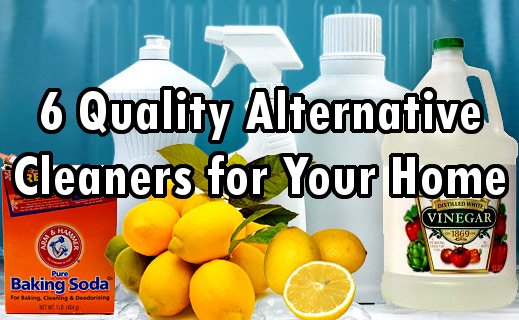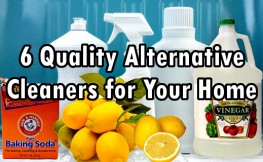Clean Your Whole House With Only 6 Inexpensive Items and NO Nasty Chemicals

 With all the talk of eating organic lately, you’d still be missing an important step to good health if you continued to use toxic chemicals to clean your house. Chemicals used to clean our windows, floors, furniture, carpets, and clothing are tampering with our bodies. Even our babies’ bottles can be full of chemicals that are known carcinogens, neurotoxins, and endocrine disruptors. But you know what, it doesn’t need to be this way – there are indeed natural alternative cleaners.
With all the talk of eating organic lately, you’d still be missing an important step to good health if you continued to use toxic chemicals to clean your house. Chemicals used to clean our windows, floors, furniture, carpets, and clothing are tampering with our bodies. Even our babies’ bottles can be full of chemicals that are known carcinogens, neurotoxins, and endocrine disruptors. But you know what, it doesn’t need to be this way – there are indeed natural alternative cleaners.
According to the David Suzuki Foundation:
“. . .researchers in the U.S. identified 133 unique volatile organic compounds (VOCs) emitted from a small sample of consumer products, including six cleaning products. Each product tested emitted between one and eight chemicals classified as toxic or hazardous under U.S. federal laws.”
These cleaners even sometimes have alarming warnings on their labels, of course in fine print:
- “Suspected of Damaging Unborn Children.”
- “Chemical Known the State of California to Cause Cancer.”
- “Will Penetrate Skin and Attack Underlying Tissue and Bone”
Yet people unknowingly go about using them on a daily basis.
What’s more is that people spend millions on toxic cleaning products when they don’t need to. Natural ingredients that can clean your house from top to bottom can cost pennies compared to national brands like Windex (which contains Propylene Glycol, Isopropanol, Ethylene Glycol n-hexyl Ether, Monoethanolamine, and Ammonium Hydroxide), Lemon Pledge, (which contains Butane, Propane, Isobutane, and Silicones derived from petroleum), and other ‘best-selling’ cleaning products that may contain ammonia, formaldehyde, phthalates, benzalkonium chloride, and 2-butoxyethanol, for example.
6 Alternative Cleaners for Your Home
So what are the 6 things you’ll need to clean wood, tile, and laminate floors, your microwave, your clothes, and everything in between? Here they are:
- 1. Baking Soda – Not only has baking soda been used to reverse stage IV prostate cancer, but it cleans everything in your house without adding toxic chemicals to the mix. You can make a baking soda paste to clean grout in your bathroom and kitchen, scrub out an old porcelain tub, or deodorize your cat’s litter box. It makes sinks look brand new, and even cleans tea stains from glass and plastic containers. Clean your brushes and combs with baking soda, or add a little to your shampoo to rinse away residues that are left behind. Try freshening your sponges with it, or use it to scrub down pots and pans. Remove unsavory smells from your drain by sprinkling some and letting it sit for a bit before rinsing the drain out. There are literally hundreds of uses for this stuff; every household should buy it in bulk.
- 2. Hydrogen Peroxide – When used in conjunction with baking soda, or even alone, hydrogen peroxide is a great non-toxic cleaning agent. To get mineral deposits off coffee or tea kettles, mix baking soda and hydrogen peroxide in a small bowl to form a paste. Use the paste to clean stubborn stains, on kettles, in the microwave, or even off of non-dry-clean clothing items before you put them in the wash. You can also wipe out your refrigerator or the top of your stove with hydrogen peroxide, or use it to clean the toilet bowl. Lastly (but not really), it’s wonderful for all types of floors when mixed with a gallon of hot water.
- 3. Vinegar – This non-toxic cleaning substance is really inexpensive. Naturally anti-bacterial, vinegar can rid your house of mold and dust. It’s so effective you could almost use this item all by itself to clean everything in your house. To remove room orders, place a bowl of vinegar out overnight; it should absorb all the ‘stink’ in the night. Using a bottle, mix half vinegar and half water to clean stains in carpets or on clothing. Use it instead of that toxic blue stuff to clean your windows, and countertops. To clean wood paneling, floors, or furniture, use a mixture of 1/2 cup olive oil, 1/2 cup vinegar, and 2 cups warm water. Apply to wood with a soft cloth, and dry with a clean cloth.
- 4. Hot Water – Many people overlook the effectiveness of cleaning with just good old-fashioned hot water. In place of many harsh detergents, soaps, and chemicals, you can simply use warm to hot water to sanitize and kill germs. Hot water can clean clothes, lightly soiled dishes, floors, tabletops, and more. Some people even swear by using only hot water and a washcloth to clean their faces, and they get better results than using chemically-laden, expensive soaps and facial scrubs.
- 5. Olive Oil – In place of harsh detergents that can strip floors, furniture, and other more delicate items of their beauty, olive oil is a great substitute for wood floor cleaners or furniture polish, and it makes the natural wood grain shine like the sun – no toxins added. Olive oil may also repair scratches in your leather furniture, and easily get dirt and grime off hands that have worked in the garden all day. It can add shine to stainless steel appliances, and even keep rattan and wicker furniture from cracking.
- 6. 100% Organic Castile Soap – Castile soap is a cheap, versatile, and non-toxic cleaning ingredient. What’s more, you can buy it in bulk and dilute it quite a bit with water to make last. One of the best uses of castile soap is in place of ‘liquid’ plumbing chemicals. Just pour a few drops down the drain and then rinse with plenty of water. It can refill all the soap dispensers in your house, makes a great dish soap, and can be used to clean the floors or bathroom fixtures. It is a great carpet cleaner when mixed with water and it can also remove pesticides from fruit and vegetables. For more castile soap uses, have a look here.
The Environmental Working Group has a Hall of Shame for household cleaners. Take a look to be certain you aren’t using the worst of the worst, but it could be simpler to just use the 6 items above instead and detox your household cleaning supplies in one grand act, saving lots of money in the process.

I like castile soap, but it is not great for anything that does not use SOAP. Soap has fat, and fat is sticky, which attracts more dirt. Better to use something higher on the list for carpets. Or better yet, rip up that nasty stuff and use throw rugs that can be laundered!
Anyone who actually thinks through what carpets are (you bring in all manner of filth on your feet, transfer to carpet, then through to pad, and then spend endless time and money trying to remove all that filth with toxic chemicals–UGH) will have them out the door asap.